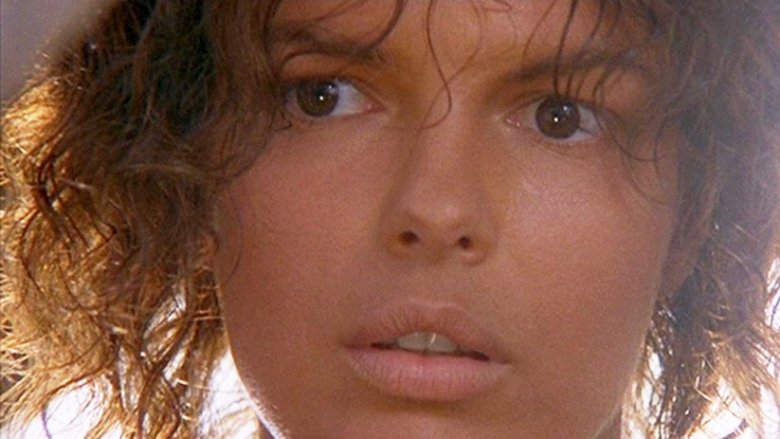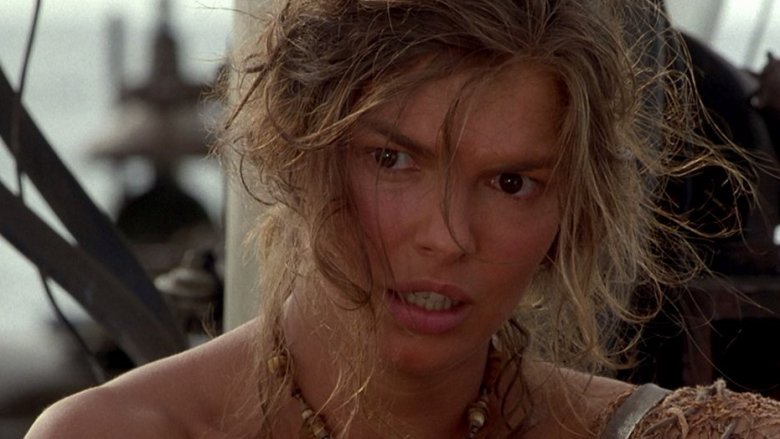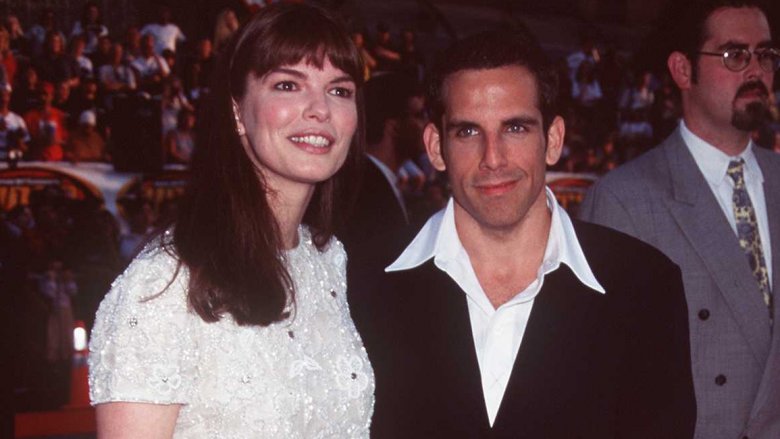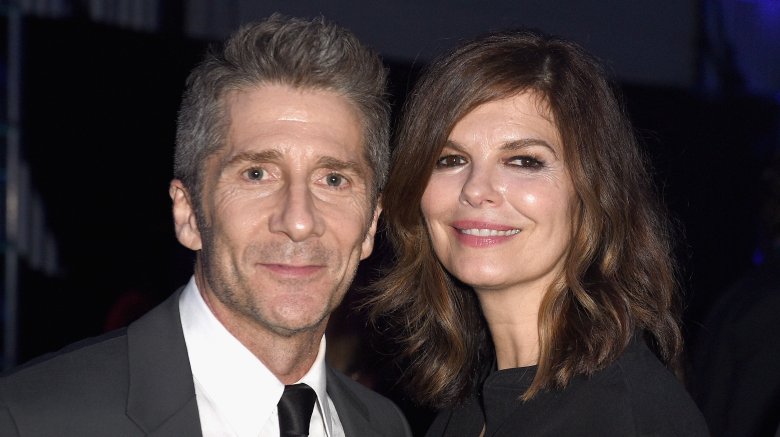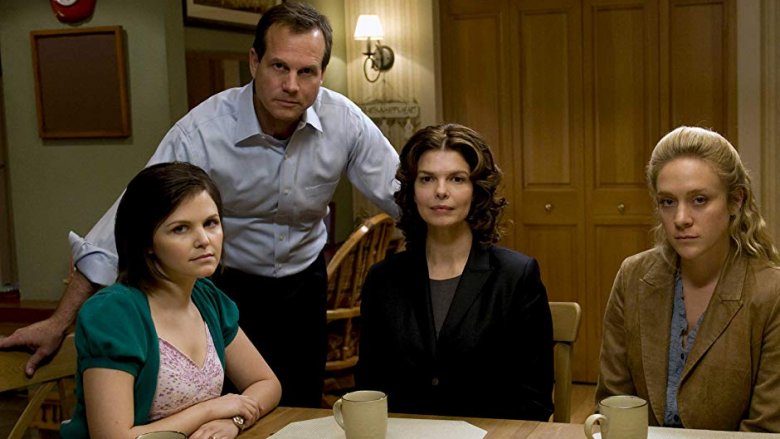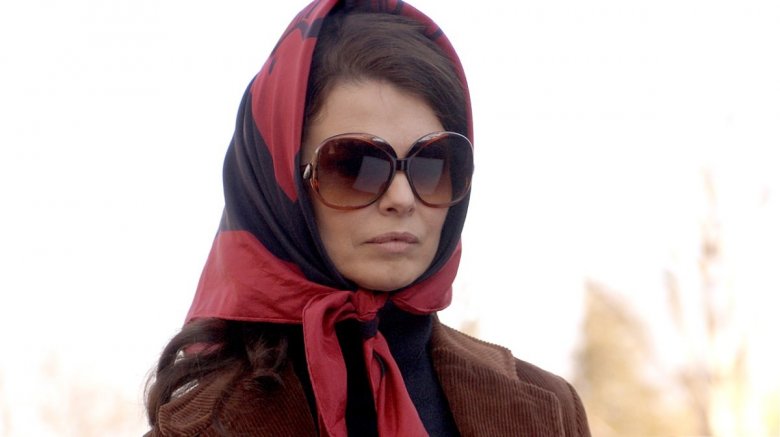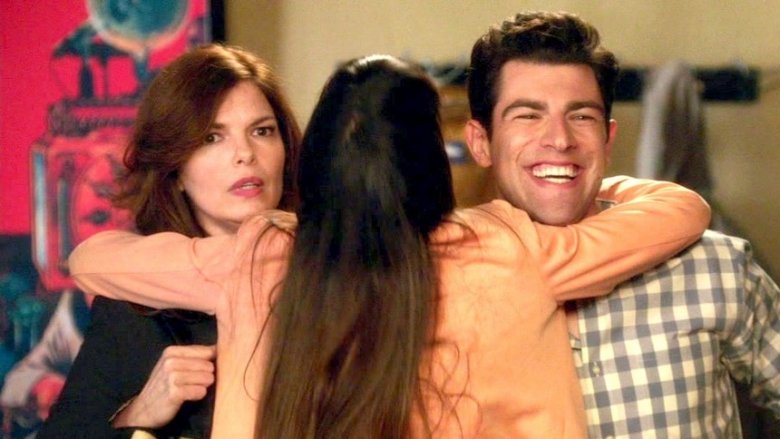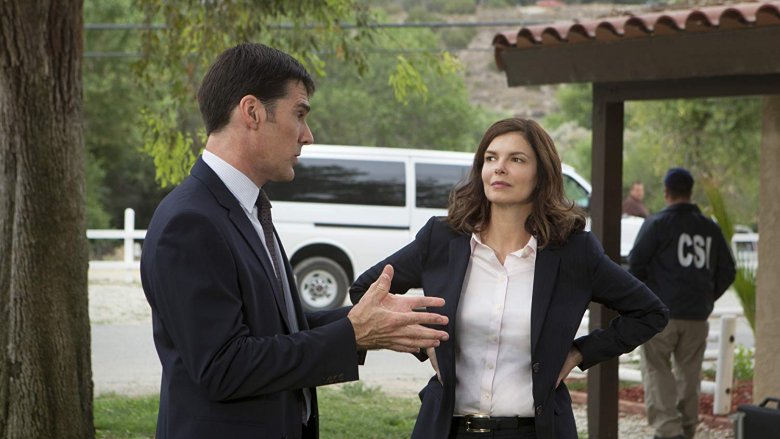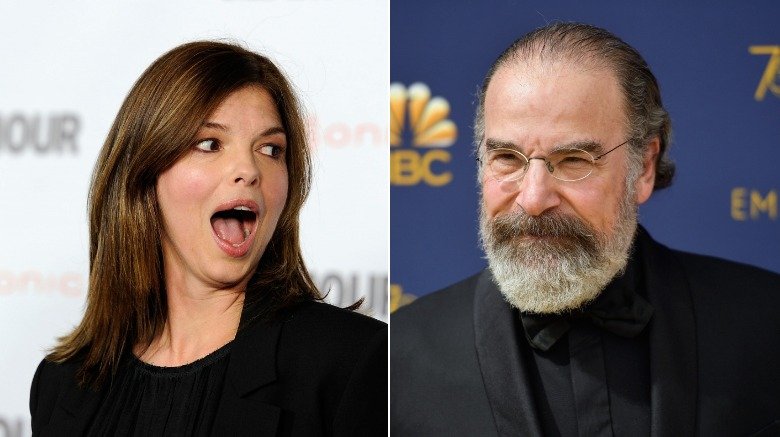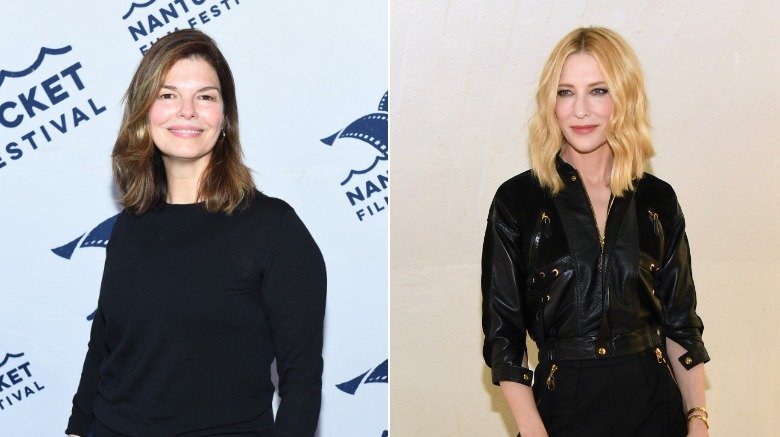Whatever Happened To Helen From Waterworld
If its detractors are to be trusted (and few who saw it could be described as "supporters"), 1995's Waterworld was not Jeanne Tripplehorn's finest moment. In fact, it could hardly have been the finest moment of anyone who appeared in or was at all involved with the flick. Jeanne Tripplehorn, whose on-screen acting career began in the '90s, stars as female lead Helen in the aquatic dystopian epic opposite the web-toed Kevin Costner. It's really quite a spectacle.
The failure of Waterworld could have threatened a promising career, but luckily the watery disaster was far from Tripplehorn's only noteworthy credit. (Kevin Costner also managed to bounce back, for whatever that's worth.) Jeanne Tripplehorn kept pushing and has enjoyed quite the career in Hollywood, spending more and more time on screens big and small since the mid-'90s. And she doesn't seem to be slowing down anytime soon. Here's what happened to Helen from Waterworld.
She survived Waterworld
Thankfully, not only did Jeanne Tripplehorn's career survive the disaster of Waterworld, she physically survived the experience as well. And no, that wasn't a guarantee. No one died on the set of Waterworld, but not for lack of the sea's trying. Shot in Kawaihe Harbor of the Big Island of Hawaii, the shooting of Waterworld wrapped with at least five members of its cast and crew coming dangerously close to kicking the bucket, including Tripplehorn.
Kevin Costner, who played the Aquaman/Mad Max lead of the film, said he nearly died when he was suspended 40 feet in the air over a sailboat for a stunt. When intense winds kicked up, the actor was slapped with water and thrown against the sailboat mast for half an hour because the winds were too strong to lower him. Costner's stuntman also nearly died, though in his case it was from the bends after ascending too quickly from a dive.
Tripplehorn's brush with the Great Beyond came relatively early in the shoot. The same month Waterworld started filming, Tripplehorn and then-12-year-old actress Tina Majorino (who later played Deb in Napoleon Dynamite) were aboard a sailboat when part of the boat snapped off and both actresses plunged into the ocean. Luckily, around a dozen divers were on hand to jump in after Tripplehorn and Majorino, and both were safely returned to the boat.
She left Ben
In the early-to-mid-nineties Jeanne Tripplehorn and comic actor Ben Stiller were a popular couple. Tripplehorn appeared on three episodes of The Ben Stiller Show and in 1993, the same year she played Tom Cruise's wife in The Firm, Tripplehorn and Stiller were engaged to be married. Unfortunately for fans of the pairing, the engagement was called off when the couple split in 1996.
Both Tripplehorn and Stiller kept quiet about the reasons for the break-up, though a People column from May 1995 could be revealing. Back then columnist Mitchell Fink claimed he discovered that Tripplehorn initially left Stiller for Waterworld stuntman David Barrett. Fink dished that Tripplehorn decided she'd made a mistake and ditched Barrett in hopes of reconciling with Stiller.
If Fink's report is true, then it seems likely the couple did get back together at some point, because their permanent split didn't come until the following year. Why the later split happened is anyone's guess, though if you start dating one person while you're already engaged to another — regardless of the reason — it seems likely that your relationship is already on pretty shaky ground.
She married Leland Orser
After meeting him on the set of the 1998 black comedy Very Bad Things, Jeanne married character actor Leland Orser in 2000. They remain together to this day and have a son, August Tripplehorn Orser.
TV viewers may recognize Orser as Father Romero on Showtime's Ray Donovan or Chief of Surgery Dr. Lucien Dubenko on ER. He plays Sam in all three Taken films, and in the nineties he became known for a string of small but memorable roles. Orser plays the john forced by John Doe (Kevin Spacey) to kill a sex worker in 1995's Se7en, the alien host/victim Purvis in 1997's Alien: Resurrection, and traumatized pilot Lieutenant DeWindt in 1998's war epic and awards magnet Saving Private Ryan.
Orser and Tripplehorn got the opportunity to work together a decade after their wedding vows. Bitten by the writing bug after working with young film students at Utah's Sundance Institute, Orser wrote, directed, and starred in Morning, a drama about a couple coping with the death of their only son. Tripplehorn played grieving mother Alice. When speaking to SF Gate about the experience in 2010, Orser seemed eager for more writing and directing projects. Morning was only released in four theaters domestically and received mixed reviews, which could be why Orser hasn't pursued further work as a filmmaker.
On Big Love, she was one of three wives
In 2006, Jeanne Tripplehorn landed a role that brought her back to the spotlight in a big way. In her first starring role in a television series, Tripplehorn was cast in the HBO drama Big Love. The acclaimed series follows the Fundamentalist Mormon Henrickson family who still practice polygamy. The late Bill Paxton plays Bill Henrickson, the family patriarch, and Tripplehorn stars as Bill's first wife Barbara. As the elder wife, Barbara acts as both older sister and mother figure to Bill's other wives Nicolette (Chloë Sevigny) and Margene (Ginnifer Goodwin), though she's unsatisfied with her place in the family.
Starring on a TV series was clearly a big change for Tripplehorn. During a roundtable interview with the L.A. Times during Big Love's third season, Tripplehorn confessed "by the eighth or ninth episode" of that season she needed "to write down what had already happened" to keep up with the plot. Barbara proved one of the acclaimed series' most complex characters, so much so that Tripplehorn admitted to the L.A. Times that by the third season she still didn't fully understand her character. "She's just really conflicted," Tripplehorn explained. "And then sometimes she's accepting of situations that I would have thought were established that Barb wouldn't like."
She played Jackie O in Grey Gardens
Big Love proved to not be the only HBO production Tripplehorn would be involved with, and her next project would earn her an Emmy nomination. In 2009, Tripplehorn starred as widowed First Lady Jackie Kennedy-Onassis in HBO's Grey Gardens. The film is named for the 1975 documentary following the lives of two former New York City socialites who, impoverished, eventually lived in the crumbling Grey Gardens mansion. The 2009 film's main subjects are Jackie O's cousin Edith Bouvier Beale, a.k.a. "Little Edie" (Drew Barrymore) and Little Edie's mother Edith Ewing Bouvier, a.k.a. "Big Edie" (Jessica Lange).
The film was adored by critics, and awards season wasn't stingy with accolades. Grey Gardens received the 2009 Television Critics Association award for Outstanding Achievement in Movies, Miniseries, and Specials; three Golden Globe nominations including two wins; and a stunning 17 nominations for the 61st Primetime Emmy Awards and six wins.
Despite appearing only briefly, Tripplehorn proves a memorable presence in Grey Gardens. Entering the narrative "as a gentle, morose Jackie Onassis," there to support her struggling relatives, Tripplehorn gives what DVD Talk's Jason Bailey calls a "wonderfully understated" portrayal of the revered widow. Grey Garden's 17 Primetime Emmy nods included a nomination for Tripplehorn for Outstanding Supporting Actress in a Miniseries or Movie.
She was no new girl to comedy
Jeanne Tripplehorn also appeared on two episodes of the Fox dramedy New Girl. Tripplehorn played Ouli, who she called the "completely inappropriate and open-minded" ex-wife of Russell (Dermot Mulroney), who at the time was the boyfriend of Jess (Zoey Deschanel). Playing the dreaded Ex, Tripplehorn's Ouli got to make an already awkward situation more awkward by doing things like hugging Jess while naked in a steam room.
Tripplehorn told The Hollywood Reporter she was already a regular New Girl watcher when she got the call from series creator Liz Meriwether, and that getting a spot on the show was like "getting an invitation to a really good party." More than that, it was a welcome return to comedy for Tripplehorn, something she told THR she craved. While she's become known more for serious drama, her earlier career had plenty of comedy credits, like The Ben Stiller Show and Mr. Show.
"I left Julliard and immediately started getting cast in dramas," Tripplehorn explained, "which was great, but comedy has always been where my heart is. In Hollywood, when they get you pegged, it's really hard to get out from under people's perceptions of you."
She was a criminal mind
In 2012, Tripplehorn nabbed her first main cast member spot on a TV series since Big Love on CBS' police procedural Criminal Minds. She first appeared in the series' season 8 premiere, "The Silencer," as FBI Agent Dr. Alex Blake, a new appointment to the Bureau's Behavioral Analysis Unit seeking redemption after making the wrong call on an earlier case. She stayed on board Criminal Minds for two seasons, leaving after season 9's two-part finale "Demons."
Tripplehorn's character was a replacement for Paget Brewster's Emily Prentiss, who appeared on Criminal Minds for six years before leaving the series after the end of season 7. According to EOnline, Tripplehorn decided to step away from the series herself after "failed contract negotiations." But the actress stayed long enough to make her unique mark on the series, and didn't waste the opportunity to get into a Public Relations dust-up with one of the more prominent Criminals Minds alums.
She crossed swords with Inigo Montoya
The first major talent departure from Criminal Minds was the series star Mandy Patinkin. CBS announced in July 2007 that Patinkin had asked to be released from his contract after failing to show up at a table read during the third season. In September 2012, as Jeanne Tripplehorn's time on Criminal Minds was just beginning, Patinkin opened up about his departure from the series to New York Magazine, calling his decision to ever appear on the show his "biggest public mistake."
Patinkin described working on the series as something that was mentally and spiritually harrowing. "I never thought they were going to kill and rape all these women every night, every day... It was very destructive to my soul and my personality." Patinkin went on to attack Criminal Minds and shows like it. "Audiences all over the world use this programming as their bedtime story," Patinkin warned. "This isn't what you need to be dreaming about."
Tripplehorn didn't buy Patinkin's criticisms. She called out the actor publicly, pointing out that Patinkin's new series — Showtime's Homeland — was just as violent as Criminal Minds. "I think it's really funny that people are giving it (his view) any kind of attention," Tripplehorn mused. She also implied that Patinkin's stated grievances weren't the end of the story. "I don't know the relationship he had with the producers and network," Tripplehorn said, "and I think there's a lot more going on (with Patinkin) that's none of my business."
She'll be part of Mrs. America
In Tripplehorn's next high-profile project, she'll be appearing as part of an impressive gathering of talent including Cate Blanchett, John Slattery, Elizabeth Banks, Uzo Aduba, James Marsden, and more in the FX mini-series Mrs. America, set to debut in 2020. The series focuses on conservative activist Phyllis Schlafly, who successfully fought against the ratification of the Equal Rights Amendment to the Constitution of the United States and continued to espouse such controversial views as the denial of marital rape, saying in 2008, "When you get married you have consented to sex." Schlafly passed away from cancer in 2016 at the age of 92.
Blanchett will play the lead, and Tripplehorn appears as Phyllis Schlafly's sister-in-law, Eleanor Schlafly. While Eleanor was not as well known as Phyllis, she had similar beliefs and invested in them just like her sister-in-law. Along with Eleanor's brother Fred Schlafly, they cofounded the Cardinal Mindszenty Foundation in 1958 "to oppose Communism and to promote traditional religious, family, social, and patriotic values."
